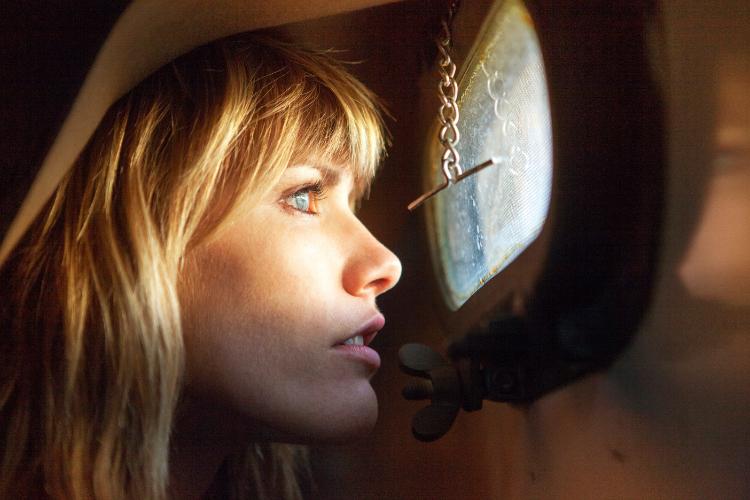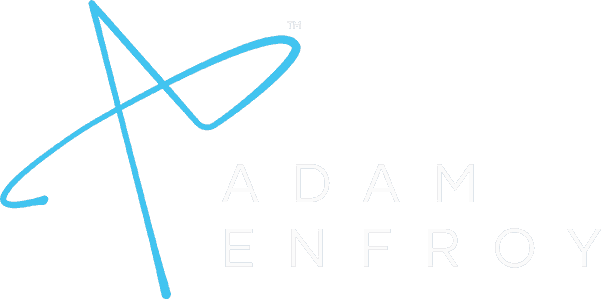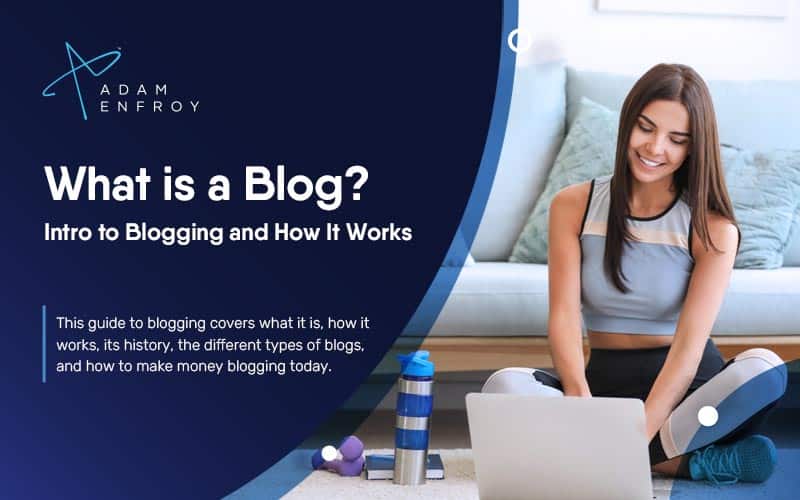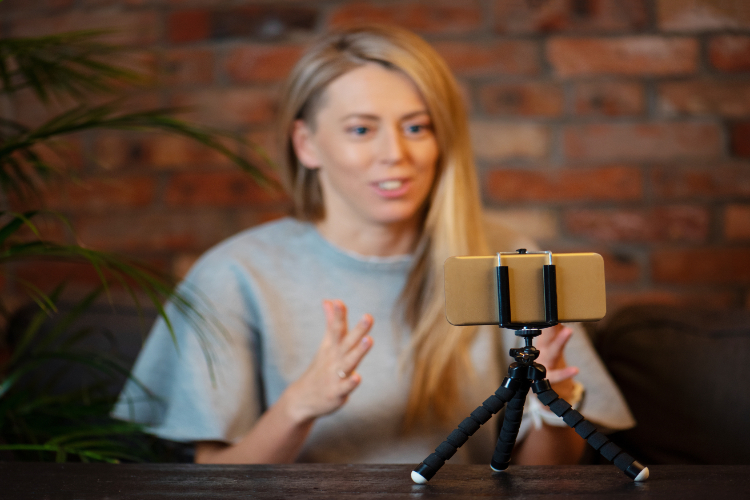17 Viral First Podcast Episode Ideas to Explode Your Podcast

Your heart races. Your voice shakes. But you hit the record button anyway.
Then… silence. What do you say?
The pressure of that first podcast episode gets to you.
However, it doesn’t have to be that way
You could avoid all the trouble and launch your podcast with a bang.
In this article, I discuss the best first podcast episode ideas to consider.
These ideas will help build momentum and put you on the podcasting map.
And if you’re new to podcasting, why not start by understanding what podcasts really are and how they work? Curious about podcast trends? Check out the ultimate list of podcast statistics . Then, when you’re ready to launch, choose from the best podcast hosting platforms to get your show off the ground.
What Are The Best First Podcast Episode Ideas?
Here are the best ideas for the first podcast episode.
1. Personal Introduction
Telling people who you are is important as a first podcast.
With a personal introduction, ensure you use stories to create a connection with your audience.
These stories could include critical moments leading to you starting your podcast.
It’s also essential to make your first podcast relatable.
The right stories will make connecting with your audience so much easier.
Including key events or influences (that your audience will care about) is also a good idea.
For example, mentioning the latest developments in your field or even a particular interest will go a long way.
Your first show has great potential to set the tone for future podcast episodes.
2. Industry Trends and Predictions
Consider a deep discussion on current trends and predictions in your industry.
Let’s say you deal with technology.
Why not dive into the rise of AI and machine learning?
These subjects aren’t just buzzwords – they’re reshaping industries.
They also make for a great very first podcast episode.
If you’re into healthcare, you could dedicate your first episode to what’s happening now and in the industry’s future.
You could discuss advancements in telemedicine. Personalized medicine and genomics are another fascinating angle.
The aim is to show you’re an expert in your industry and that your audience should trust what you say.
3. Expert Interview

The right expert can be vital to making your show memorable.
When considering who to invite, think about criteria such as:
- their expertise in your podcast topic
- their ability to share engaging stories.
- their relevance to your target audience.
Once you identify the expert, reach out professionally.
Make sure to present a compelling reason why they should join your first podcast episode.
Once they accept, preparation is vital to ensure your expert interview goes smoothly.
Research the expert’s background thoroughly to tailor your questions specifically to them.
Also, compile a list of engaging questions that will captivate your audience.
This preparation will make your expert feel valued, leading to a more dynamic conversation.
4. Top 10 Mistakes Beginners Make in [Your Topic]
Say your podcast topic is blogging.
A common pitfall is not defining a clear target audience.
This can make it challenging for listeners to connect with your podcast.
Additionally, maintaining an inconsistent posting schedule can hurt your podcast’s credibility.
All of these can be great podcast ideas for your first show.
You’re sharing what you learned and helping others avoid costly mistakes.
Here’s an example from the world of fitness training.
Overtraining and burnout are common among new people at the gym.
Discussing how to avoid these pitfalls in your first podcast episode is great.
These topics will engage your audience with practical tips (and interesting stories).
By exploring these topics in your intro episode, you can offer valuable insights that will prepare your listeners for more advanced discussions in future episodes.
Always incorporate a mix of personal stories and examples.
Doing this will make your content relatable and engaging.
5. Listener Q&A
Want to know one of the most engaging and dynamic ideas for that first podcast episode?
Conducting a listener Q&A.
Start by gathering questions from your audience (or others’) through various platforms.
Going on social media groups works well if you don’t have your own audience.
If you do, ask your followers what they’re struggling with.
This active participation helps you connect with your listeners and provides lots of content for both the first and future episodes.
The best thing is that you’ll know exactly how to make your podcast more relatable and interactive.
When structuring the Q&A session, consider grouping similar questions together.
This method creates a cohesive flow and tackles related queries in one go.
You should also do shout-outs to participants to add a personal touch.
Acknowledging their contributions goes a long way in building a loyal listener base.
At the end of the show, don’t forget to invite follow-up questions to keep the conversation going.
6. Case Study Analysis
Here’s another great strategy for your very first episode.
- Analyze a powerful case study that connects deeply with your intended audience.
- Choose a personal story or a significant event that provides valuable insights.
- Share your findings through storytelling in the form of a case study.
This approach sets the tone for new episodes and differentiates you from other podcasts.
It also demonstrates depth and thoughtfulness right from the start.
Consider inviting people who lived through the event to enhance the reach of your case study episode.
You can even invite interview experts who can provide additional perspectives.
When conducting a case study analysis, balance detailed storytelling and actionable insights.
Remember that breaking down the case involves highlighting the subject’s key challenges and solutions implemented.
This ensures that listeners gain both an emotional connection and practical knowledge.
7. Behind-the-Scenes Look

Providing a behind-the-scenes look is another fantastic idea for your first podcast episode.
Drawing comparisons with other podcasts can help your listeners see what sets your show apart.
Don’t forget to share insights about the technical aspects of creating your podcast.
Discussing:
- the equipment you use
- the challenges you face and
- the lessons learned along the way
…can be incredibly engaging to your listeners tuning in.
Encouraging them to return for more episodes then becomes easier.
8. Debunking Myths
Share a personal story of when you once believed certain myths.
Then explain how your journey led you to uncover the truth.
This is another format that combines storytelling with valuable insights.
You could even Invite people with different perspectives and interview experts in the field.
Their experiences and viewpoints can add depth to your episode.
You can also mention other podcasts that have successfully debunked related myths.
When you mention others, you’re associating yourself with those who are further ahead of you.
This “borrowed credibility” is great for building momentum in the early stages.
It also shows your audience you’ve done your research in the podcasting landscape.
9. Your Favorite Tools and Resources
Sharing your favorite tools and resources is always a crowd favorite.
People always want to know what tool stack others use.
What I would do is start by telling a personal story about how you discovered these tools.
Speak about how they have impacted your (podcasting) journey.
This not only humanizes your story but also helps to create meaningful connections.
Letting your audience into your world makes your new episodes more relatable and engaging.
You might even invite others to share their own tools in future episodes or after your podcast in social media interactions.
This exercise makes it easier to get people to follow you on social media and start communicating with you on multiple channels.
10. A Day in the Life
Want to build a great connection with your audience from the start?
An engaging “Day in the Life” podcast can be a great format for your first episode.
You can weave in your personal story, and showcase your daily routines, work habits, and leisure activities.
This personal touch humanizes you to your audience and sets the stage for meaningful connections.
You might even consider inviting a co-host (who knows you well in real life) for a podcast segment.
This segment would add a dynamic range of perspectives.
The aim of a “day in the life” is to provide your listeners with knowledge and inspiration.
If it all goes well, you could even have future episodes using the same theme that focus on varied aspects of your life.
The more human you come across, the better connection you’ll build.
11. Historical Perspective

Are you a history buff?
Diving into a historical perspective can make your first episode stand out and attract listeners.
These listeners would be those who appreciate depth and context.
These two qualities are important in people that would follow you long-term.
In a “historical perspective” podcast, start by discussing the origins of your podcast’s subject matter.
First, offer a rich backdrop.
Include a personal story about what drew you to the subject and led to the creation of your podcast.
This helps in building meaningful connections with your audience.
As you explore the historical perspective, encourage people to consider the topic’s continuity and change.
Highlight how understanding the past can offer insights into current trends and future possibilities.
12. Hot Takes and Controversial Opinions
Looking to stir up some controversy?
Some topics lend themselves well to this.
Let’s say you dive into a debate about climate change.
Some people will love you. Others will hate you.
As part of your episode, you could discuss controversial solutions to global warming or examine the impact of climate policies.
You could even combine the “debunking myths” idea with a “listener Q&A” while getting an “expert interview” in place.
Getting the right mix as part of your first podcast will set the stage for meaningful connections with your audience.
Here’s another industry – educational reform.
On your podcast, you could tackle opinions on standardized testing or explore the pros and cons of school choice and voucher systems.
Offer personal stories from teachers, parents, or students that can bring these issues to life.
What’s important is that you offer listeners relatable content.
In sports, you can engage in discussions about performance-enhancing drugs or debates over athlete compensation.
You could hold interviews with sports analysts (or athletes themselves) who can share insights that aren’t widely discussed.
Such high-stakes topics in your first episode can really set the stage for the future.
13. Inspirational Stories

Imagine sharing personal stories of entrepreneurs who have overcome immense failures to achieve success.
These narratives are not only compelling.
They also set a precedent for what your new episodes might cover.
This can also apply to any niche.
For example, highlight stories of individuals who have accomplished remarkable weight loss or fitness transformations.
Showcase those who have overcome addiction.
Such heartfelt stories hit the right notes with the right audiences.
The best thing is that you invite listeners to relate and find inspiration in their own lives.
Also, sharing these narrative podcasts as part of your first show creates a ripple effect where your listeners will tune in to every new episode.
14. Step-by-Step Guides
This is a great idea if you follow processes in your businesses or daily life.
Say you’re an online blogger.
You could:
- Discuss the nuances of choosing a niche and domain.
- Setting up a website.
- And crafting compelling content.
What’s key is that you turn it all into a formula.
If someone were to follow this formula step-by-step, they would get similar results.
You can also go into the ups and downs you faced along the way.
Then, explore the lessons learned along the way.
You could also show different paths to achieve a successful start.
Let’s consider another industry.
Imagine you want to talk about beginning a fitness routine.
Offer actionable advice on setting realistic goals and creating a balanced workout plan.
There’s a step-by-step formula people can follow to do something similar.
If you’re at the beginning of your journey, you could also invite people to join you.
Just make it clear you’re still figuring stuff out.
In this case, it would be great to interview experts in fitness and share their insights.
Here’s another example.
Say you want to go deep into launching a small business.
Focus on the steps involved in writing a business plan.
Speak about securing the necessary funding and resources.
There are so many (step-by-step) items to talk about.
At the end of your podcast, encourage your listeners to subscribe for more new episodes.
15. Current Events and Their Impact
Discussing current events (and their far-reaching effects) can be a compelling topic.
For example, invite people to share their personal story about how the COVID-19 pandemic altered their lives.
Consider anything from remote work and education changes to the broader impact on global economies.
Compare these changes to trends observed in other podcasts.
Then draw meaningful connections for your listeners.
Podcasts based on current events provide an excellent opportunity to interview experts and activists.
The idea is to provide a rounded view of these issues.
Doing so will create rich content that builds up an audience quickly.
16. Listener Success Stories
To pull this off on your first podcast episode, you must have an audience built on another channel.
It also depends on the people your business helps.
In any case, these personal stories resonate with other listeners and inspire them to keep tuning in.
Whether you share tales of individuals paying off significant debt or achieving financial independence, there’s so much you can do.
The aim of this first podcast episode idea is to create meaningful connections.
Say you help people achieve career success and you decide to share examples of people who have used your methods to reach their goals.
The right stories highlight what you do and how this will bring people what they want.
The best part?
You’re not bragging about your achievements.
Others are sharing your work and its effect.
These episodes can provide:
- valuable advice
- uplift those looking to make significant changes
- and help share your expertise
…all in one single episode.
17. Future Plans and Goals for the Podcast

Sharing your vision can be a great way to start.
You can provide a preview of future topics to pique listener curiosity.
Ideas can include:
- Announcing special guest appearances
- Outlining your plans for community engagement.
- Describing plans for listener meetups
- Go deep into how you intend to build an online community.
These ideas will help people become more involved with your podcast – beyond just passive listening.
Additionally, discuss your intentions to expand your content to make it as valuable as possible.
You can also mention your plans to spread your content across additional platforms.
Sharing these future goals shows you have a long-term vision that will help people get sold on joining in.
Creating A Great First Episode
Crafting the first episode well is essential to setting the tone for your podcast.
The structure and flow should be well-defined to ensure listeners are engaged from start to finish.
Here’s what to think about in terms of flow and structure.
Introduction
Start with a compelling hook.
Here you introduce the topic and the host(s) in an interesting way.
This is your first chance to capture your audience’s attention and set the stage for the episode’s content.
The Main Content
As you move into the main content, think about structuring the core segments.
The main content should be organized logically -whether you opt for interviews, discussions, or storytelling.
If you’re featuring celebrity interviews, start with background information on the guest.
Doing this right will provide context and build anticipation.
Additionally, think about transitions between segments to maintain a seamless flow.
You don’t want any abrupt changes that could disrupt the listener’s experience.
The End
When you conclude, summarize the key points discussed in the episode.
A strong outro can include a brief recap and a clear call to action.
You should also encourage listeners to subscribe, share, or visit your website for more content.
This section is crucial to make listeners eager to tune into the next episode.
After the Episode
Once you’ve wrapped up recording your first podcast episode, the journey doesn’t stop.
Transitioning from raw recording to a polished piece involves a few steps.
These steps include:
- Editing
- Polishing
- Publishing.
Basic editing techniques are essential to improve the audio quality and overall listener experience.
For example, removing background noise helps create a clean, professional sound.
Trimming unnecessary silences keeps your content engaging and tight.
Adding music or effects can elevate your show’s overall feel and atmosphere.
Publishing and promoting your episode is the next crucial step.
Selecting a publishing platform is vital.
These platforms generally streamline the publishing process, ensuring your content reaches your audience efficiently.
Finally, don’t forget the importance of podcast directories.
Submitting your podcast to major directories like Apple Podcasts and Spotify is essential for visibility.
Being available on these platforms increases the chances of attracting new listeners.
Conclusion
Your first podcast episode is crucial.
Done right, it sets the tone and grabs listeners both in the short and long term.
By using the above ideas, you can make a great first impression.
Whether you share a personal story, interview an expert, or dive into industry trends, make it engaging.
Keep your audience hooked from the start.
Now, it’s time to hit record and let your voice be heard.
Further reading on AdamEnfroy.com:
Looking for the perfect name for your podcast?
Check out these catchy podcast name ideas to make your show irresistible.
If you’re wondering how to present your podcast to potential sponsors or guests, don’t miss my guide on pitching a podcast like a pro.
For those just starting, the podcast starter kit covers everything you need to launch your show.
And if you want your recording space to look top-notch, explore these podcast studio rooms and background design ideas for inspiration.





